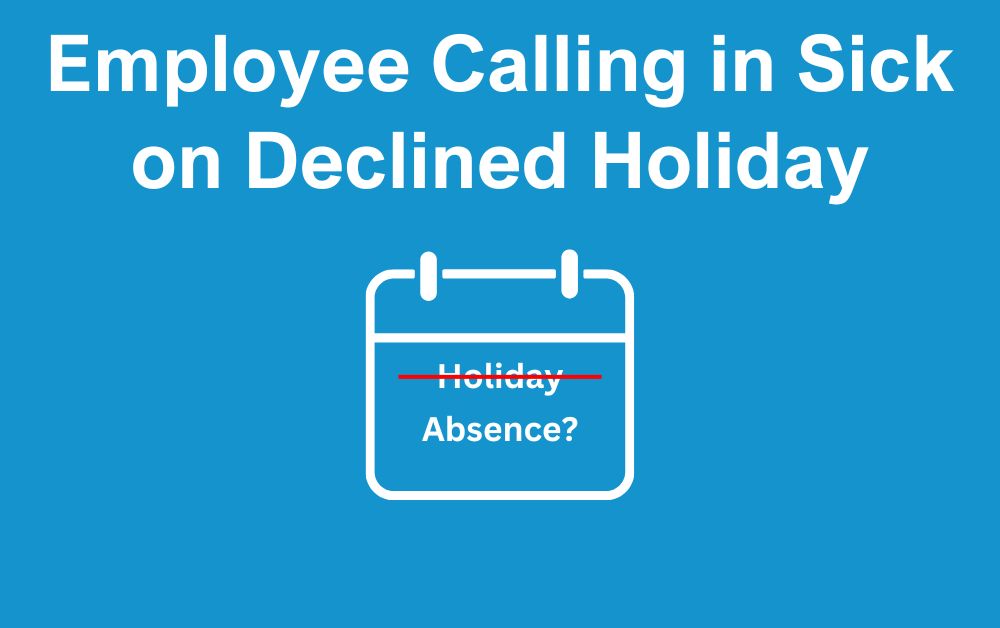As an employer, it can be frustrating and challenging when an employee is Calling in Sick on a Declined Holiday. This may not only feel very suspicious, it can also create tensions within the workplace. However, Even if you feel strongly that the absence is not genuine, you may not necessarily have clear evidence. Therefore, it’s important to approach this situation carefully, balancing your legal obligations with the need to manage your team effectively.
Here are some steps you can take if this situation arises.
Early Intervention
Your employee may not have called in sick yet, but you’ve heard rumours around the office that they’re planning to. In this circumstance, you can have a conversation with your employee and let them know of the concerning rumours you have heard. Asking them directly if this is true may deter them from making the wrong decision.
You can inform the employee that if they decide to fake an absence, further actions may be taken against them. Before you have this conversation with your staff member, make sure you have evidence of their holiday request and why it was refused. It’s also important to include these steps in your absence management policy.
Follow Your Sickness Absence Procedure
If you weren’t made aware of any rumours but you are faced with an employee calling in sick on declined holiday, we encourage you to follow the steps in your absence management policy.
Your company should have a clear sickness absence policy. This would outline what employees must do if they are unwell, such as notifying their manager within a specific timeframe and providing a fit note if they are off for more than seven days. Ensure that this procedure is consistently followed for all employees. If the employee fails to adhere to this policy, you have grounds to take further action.
Make sure that all communications with the employee are professional and documented. This may include confirming that the employee has followed the correct reporting procedures and offering support if they need it. By following your internal processes, you demonstrate fairness, and this documentation can protect your business should the situation escalate.
Monitor Patterns of Absence
If the employee frequently calls in sick after being denied holidays or if there is a consistent pattern of absenteeism around weekends or public holidays, it could indicate a deeper issue. Use your absence records to monitor any emerging patterns and address them as part of your ongoing employee management process. An online absence management tool can be a great way to access this information quickly. Breathe HR is a great system that can help you track absences and discover any possible trends.
Return to Work Interview
Upon the employee’s return, conducting a return-to-work interview is a good practice. This is a chance to discuss their absence and ensure they are fit to return to work. These interviews also provide an opportunity to identify if there are any underlying issues and if the absence was genuine.
It’s important that return-to-work interviews are handled sensitively. They should be supportive in nature rather than disciplinary. However, if the interview raises concerns or the employee cannot provide a reasonable explanation for their illness, you can then decide on the appropriate course of action. It’s important to stay on top of this issue within your business. We encourage you to put in place a system that helps you identify similar incidents.
Considering Disciplinary Action if Necessary
If you have sufficient evidence to suggest that the employee was not genuinely sick, and especially if this has become a recurring problem, it may be appropriate to take disciplinary action. Ensure that you follow your company’s disciplinary procedures, giving the employee the chance to explain their side of the story before making any decisions.
Disciplinary action could range from a formal warning to dismissal in extreme cases. However, you should always ensure that you are acting fairly and in line with employment law. Consulting with an HR professional or legal advisor before proceeding can help protect your business from potential claims.
Maintain a Positive Workplace Culture
It’s important to foster a workplace culture where employees feel valued and supported. Sometimes, frequent absences or problematic behaviour can stem from disengagement or dissatisfaction. By promoting open communication, providing support when needed, and addressing any concerns early, you can minimise the likelihood of employees feeling the need to take unapproved time off.
Encourage employees to discuss any issues they may have with their workload, work-life balance, or personal circumstances. A supportive and flexible approach can often help prevent these situations from arising in the first place.
In Conclusion
Dealing with an employee who calls in sick after a declined holiday request can be tricky. However, it’s essential to approach the situation fairly and professionally. Stick to your absence procedures, avoid assumptions, and gather evidence before considering any disciplinary action. Above all, aim to create an environment where employees feel able to discuss their needs openly, which can help prevent misunderstandings and lead to better relationships in the workplace.
By following these steps, you’ll ensure that you handle such situations in a legally compliant and fair manner, while also maintaining a positive and respectful workplace atmosphere. If you are faced with an employee Calling in Sick on Declined Holiday and would like some advice, please get in touch.







